Minister's Advisory Council: Membership
Members
The Minister's Advisory Council provides the Minister of the Environment, Climate Change, and Nature with non-partisan advice and recommendations on issues related to the implementation of the impact assessment regime.
The Council membership reflects varied backgrounds and experience in industry, academia and research, law, governance, environmental not-for-profit organizations, and Indigenous Knowledge and rights. The Council includes representation from regions across the country, both official languages and a gender balance.
- Lesley Griffiths (Chair)
- Carl Braun
- Johanne Gélinas
- Jocelyn Gosselin
- Pierre Gratton
- Anna Johnston
- Channa S. Perera
- Scott Bailey
- Dennis Mahony
- Lorena Patterson
- Bram Noble
Lesley Griffiths (Chair)
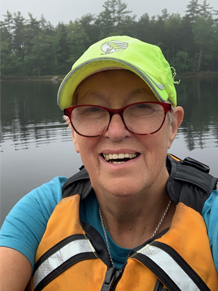
Lesley Griffiths has chaired the Minister's Advisory Council on Impact Assessment since its creation in 2020. She is a retired environmental and community planner with substantive experience with environmental assessment review panels. She first served as a joint panel member for the review of the Halifax Harbour Wastewater Treatment Facility under the previous Federal Environmental Assessment Review Office.
Subsequently, she chaired the federal-provincial joint review panels examining the Voisey's Bay Mine and Mill Project in northern Labrador, the Sydney Tar Ponds remediation in Cape Breton, and the Marathon Platinum Group Metals and Copper Mine Project in Ontario. She co-chaired the joint review panel for the Lower Churchill Hydroelectric Project, and, most recently, chaired the panel for the Joint Process to review the Milton Logistics Hub project in Ontario.
Lesley was appointed as Process Lead for the Fundy Tidal Energy Strategic Environmental Assessment and co-chaired the Nova Scotia Minister of Environment's Task Force on Clean Air, producing the province's first air quality management strategy.
For over 30 years, Lesley was Co-principal of Griffiths Muecke, a consulting firm providing services in the areas of consultation and consensus-building processes, environmental impact assessment, resource management and community development.
Ms. Griffiths has extensive experience relating to coastal and offshore planning, stakeholder involvement and facilitation, resource developments, waste management, watershed management, recreation and tourism planning, and community development. In addition, she served as Executive Director of East Coast Environmental Law.
Carl Braun

Carl Braun is an Indigenous leader and President of Ininiw Strategies, a national advisory firm helping First Nations advance sovereignty, governance, economic development, and environmental stewardship. Grounded in traditional land teachings, cultural values, and over 35 years of experience, Carl integrates Indigenous Knowledge with technical expertise in environmental science, resource management, and Crown–Indigenous relations.
Carl's work spans multiple regions and mandates across Canada. Through Ininiw Strategies, Carl advises First Nations, governments, and industry on complex issues such as consultation processes, additions to reserve, resource management, major project assessments, and United Nations Declaration on the Rights of Indigenous Peoples (UNDRIP)-aligned governance. His recent work includes advising on the Duty to Consult and Accommodate, UNDRIP, Free, Prior, and Informed Consent , cumulative effects, and First Nation law.
Carl is deeply familiar with the federal Impact Assessment Act, offering strategic advice on integrating Indigenous rights, laws, and governance into regulatory regimes. His approach builds assessment pathways that respect Indigenous jurisdiction while ensuring efficient, high-quality reviews.
A technologist by training in fisheries, wildlife, and forestry, Carl has led numerous field programs and served as a liaison among Indigenous communities, governments, and industry. Today, his focus is on designing Indigenous-centered governance, consultation, and economic models that uphold the Honour of the Crown and strengthen First Nations' jurisdiction and prosperity—shaping national standards for Indigenous-Crown relations and reconciliation-aligned processes.
Johanne Gélinas
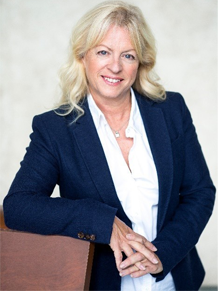
Johanne Gélinas is a strategic advisor specializing in environmental, social, and governance (ESG) processes.
She is a certified Chartered Director and holds a Bachelor of Geography and a Master of Environmental Science from the Université du Québec à Montréal.
A former President and CEO of Transition Énergie Québec, Johanne was appointed to establish a Crown corporation responsible for implementing Quebec's energy policy and supporting the energy transition, innovation, and efficiency, while ensuring integrated governance.
In 2015, she chaired an expert panel that made recommendations to the Minister of Environment and Climate Change on the federal environmental assessment process.
Johanne was a partner at Raymond Chabot Grant Thornton, and led the sustainability team at Deloitte. She also served as Canada's Federal Commissioner of the Environment and Sustainable Development.
Previously, for more than a decade, she was a commissioner at the Bureau d'audiences publiques sur l'environnement.
Johanne is a member of the board of directors of Fondaction, a fund that invests in socially responsible and sustainable growth. She also serves on the board of Æquo, which helps institutional investors engage with companies on ESG-related issues. In addition, Johanne is a member of the board of directors of the Centre québécois du Droit de l'Environnement.
Jocelyn Gosselin
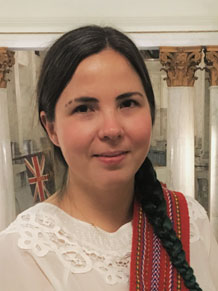
Jocelyn Gosselin is a Métis woman with ancestral ties to the Red River.
After finishing her Bachelor of Science in Environmental Management, Jocelyn lived and worked in the Alberta oil sands region for over a decade before returning to her roots in northwestern Ontario along the north shores of Lake Superior.
Jocelyn has extensive knowledge and experience in environmental monitoring program design and implementation, and impact assessment consultation. She serves her Nation by offering consulting services to support community initiatives.
She has also been appointed by her Nation to serve as the Métis representative on various other multi-stakeholder committees.
Jocelyn embraces the balance between traditional knowledge and modern science and provides policy and technical advice to both Indigenous and western governments. Jocelyn is strongly connected to her community and culture and works hard to ensure that the traditions and knowledge are passed onto her children and future generations.
Pierre Gratton

Pierre Gratton was appointed President and CEO of the Mining Association of Canada (MAC) in 2011. Based in Ottawa, MAC is the national organization for the Canadian mining industry. Its members are engaged in mineral exploration, mining, smelting, refining, and semi-fabrication.
Pierre holds a Master of Arts degree in Political Science and a Bachelor of Arts in Political Science and Economics from McGill University.
Pierre is a former President and CEO of the Mining Association of British Columbia and previously served as Vice-President, Sustainable Development and Public Affairs for MAC. In that role, he was instrumental in developing Towards Sustainable Mining, the organization's flagship program that is gaining international recognition and adoption.
In 2005, Pierre was honoured as a Distinguished Lecturer by the Canadian Institute of Mining, Metallurgy and Petroleum.
Pierre serves as a member of the Board of the Canadian Mining Hall of Fame, Co-chair of the Green Mining Initiative Advisory Committee and on the Board of Ottawa's Thirteen Strings chamber orchestra.
Anna Johnston
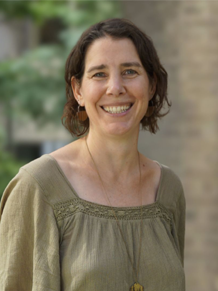
Anna Johnston is a staff lawyer at West Coast Environmental Law where she works on environmental impact assessments, cumulative effects, and biodiversity and climate law. Currently, she is the co-chair of the Environmental Planning & Assessment Caucus of the Canadian Environmental Network.
Anna earned her law degree from the University of Victoria in 2010 and Master of Laws from Dalhousie University in 2021, where her thesis focused on federal jurisdiction over next-generation environmental assessment.
Anna has represented community and Indigenous groups on environmental assessments of major energy projects in British Columbia and Alberta and provided environmental legal education and support to communities across Canada. From 2016-2019 she was a delegate to a multi-interest advisory committee appointed to assist the federal Minister of Environment and Climate Change on the review and revision of Canada's federal environmental impact assessment processes. She has written extensively on federal impact assessment and appeared on behalf of interveners at the Alberta Court of Appeal and Supreme Court of Canada in the Impact Assessment Act reference case.
Channa S. Perera
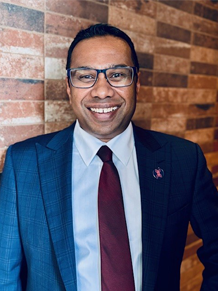
A seasoned executive, Channa S. Perera has more than 20 years of experience in policy analysis, government advocacy, program development and implementation, stakeholder engagement, and corporate strategy. This includes experience in strategic and business planning and implementation.
Channa has an Honours Bachelor of Arts in Political Science and Legal Studies and a Master of Arts in Political Science from Carleton University, and a Mini-MBA from the Executive Institute at McGill University.
He currently serves as Vice-President, Regulatory and Indigenous Affairs at Electricity Canada (previously the Canadian Electricity Association) where he is responsible for providing strategic oversight on regulatory and policy issues related to the electricity value chain. In this role, Channa also provides direct leadership to several industry committees, including Human Resources, Diversity and Inclusion, and Indigenous Relations. Prior to this, his roles included Vice-President, Policy Development, and Director of Generation, Sustainability, and Indigenous Affairs.
Channa serves on several external advisory panels. This includes the Canadian Environment Domestic Advisory Group under the Canada-European Union Comprehensive Economic and Trade Agreement.
Scott Bailey

Scott Bailey is an experienced decision-maker, negotiator, administrator, and leader with over 15 years of expertise in environmental assessments. Currently, he is President of Beacon Regulatory Solutions, which provides strategic regulatory advice and technical support for major industrial and infrastructure projects.
For approximately 22 years, Scott worked for the Government of British Columbia in various roles, including 12 years at the BC Environmental Assessment Office. While there, he served for five years as Assistant Deputy Minister and six months as Acting Associate Deputy Minister.
Between 2011 and 2022, Scott continually innovated to improve the environmental assessment framework and modernize how Indigenous relations and reconciliation was managed in British Columbia.
Dennis Mahony

Dennis Mahony is a Toronto-based lawyer who has spent more than 30 years practicing in the area of environmental law and environmental assessments. Currently, he is a senior partner and Head of the Environmental, Health, and Safety practice group at the international law firm, Torys LLP.
Dennis is certified by the Law Society of Ontario as a specialist in environmental law. He regularly chairs and speaks at environmental and health and safety law conferences in Canada and the US and has authored and coauthored numerous articles.
Dennis conceived, coauthored, and edited the 1,200-page legal text, Law of Climate Change in Canada. In 2010, the book won the prestigious Walter Owen Book Prize for outstanding contributions to Canadian legal literature.
He is the former editor in chief of the University of Toronto Faculty of Law Review and served for years as an adjunct professor at the university's law school. He is highly ranked in the leading legal guides in the world, including the Chambers Canada Legal Guide (Band 1), Legal 500 (Hall of Fame), and Best Lawyers.
Lorena Patterson

Lorena Patterson is the President and CEO of WaterPower Canada, the national association representing the hydropower industry.
She holds an MBA from the University of Texas at Austin and a Bachelor of Arts in International Development from Dalhousie University.
Her extensive experience in the energy sector includes serving in many roles at TC Energy, including Director of Canadian Public Affairs in Ottawa, Corporate Affairs and Stakeholder Relations in Mexico City, and others. Lorena was the Government of Alberta's official representative in Mexico from 2002 to 2005. For over 15 years, Lorena supported the Mexican government's efforts to understand the Canada–Alberta model of hydrocarbon development during a period when the country was seeking to develop a regulatory framework for private-sector participation in the Mexican energy sector. Lorena served as President of the Mexican Natural Gas Association's board of directors and was a board member of the Canadian Chamber of Commerce in Mexico.
In 2018, Lorena represented the Mexican natural gas industry during the Canada-United States-Mexico Agreement negotiations. She was also appointed by the Secretary of Energy for Mexico to sit on the United States (US)–Mexico Energy Business Council, which comprises both industry representatives and senior US and Mexican government officials from the Mexican Secretariat of Economy and the U.S. Department of State.
In 2008, the Right Honourable Michaëlle Jean awarded Lorena the Governor General's Award for her work in strengthening the bilateral relationship between Canada and Mexico.
Bram Noble

Originally from Newfoundland, Bram Noble joined the faculty of the University of Saskatchewan in 2002. He is currently a professor in the Department of Geography and Planning.
For the past 25 years, Bram has specialized in impact assessment (IA). He has published more than 125 peer-reviewed articles and authored dozens of technical reports for government agencies, businesses, and Indigenous Nations. He has mentored more than 60 graduate students and delivered over 150 workshop presentations and keynote addresses across Canada and internationally. He has also led or co-led multiple IA-related research projects totalling more $20 million.
His academic work focuses largely on IA methodology, best practice, and governance in areas such as cumulative effects, regional and strategic assessment, and Indigenous engagement. His work cuts across sectors, from mining and energy to regional land use plans.
Bram co-led an IA of Great Sand Hills, the first regional strategic assessment (RSA) conducted in Canada. He also worked on several other RSAs and developed guidance for the Canadian Council of Ministers of the Environment on conducting RSAs.
He has acted as an expert witness for multiple IA-related proceedings and served as an IA consultant for industry, government, and Indigenous Nations.